“If you think organic food is expensive, have you priced cancer lately?” — Joel Salatin
What is the first thing you think of when you hear someone talk about organic food? Do you get annoyed or interested? Have you done your own research and formed your own opinion or have you simply jumped on the bandwagon of eating or opposing organics? Are you still on the fence and do not understand the differences?
A discussion about health would not be complete without mentioning organics and GMOs. My goal with this post is to inform you about how organic food differs from non-organic food and how both impact your health so you can formulate your own opinion and proceed as you wish. I split up the third launch post about organics/GMOs into two because there’s a lot to cover when it comes to these topics. This post will focus on organics and I’ll cover the following info:
- what it actually means for food to be “organic,”
- which foods you should always strive to buy organic,
- what the “organic” seal means,
- reputable organic brands – private- vs. corporate-owned organic brands,
- plus more!
I’ll also provide you with current arguments for and against organics. And of course, my own beliefs will be sprinkled throughout the post.
What does “organic” mean?
Let’s start with the definition of “organic.” When a food is labeled organic, it refers to how it was grown. More specifically, organic produce and other ingredients are grown without the use of
- pesticides,
- synthetic fertilizers,
- sewage sludge,
- genetically modified organisms (GMOs), or
- ionizing radiation.
Meat, poultry, and eggs labeled organic indicates that the animals
- were raised in “natural-like” conditions, including ability to graze and have access to open air,
- were fed 100% organic feed, and
- were raised without the use of antibiotics, growth hormones, or animal-by-products.
So that means that non-organic or conventional food is grown with the use of pesticides, synthetic fertilizers, sewage sludge, GMOs, radiation, antibiotics, and hormones. When you consume non-organic food, you also consume all these toxins.
Note about irradiation
In case you’ve never heard of food irradiation, let me briefly explain this. When food is irradiated, it is zapped with radiation in order to kill micro-organisms such as bacteria, viruses, fungi, and to extend the food’s shelf life. As a result, fruits and vegetables take a much, much longer time to rot. Why is this done? Well, for one reason, think about where some of the food you consume is grown and where you live. Some of the food you eat travels long, long distances before it arrives at your local grocery store. Cuesa.org reports that your meal travels an average of 1,500 miles from the farm to your dinner table. As a result, measures have been in place, such as irradiation, to ensure that the food survives the long distances it must travel. Think about this the next time you hear the phrase,
“Shop local!”
There’s much controversy surrounding food irradiation and its labeling by the Food and Drug Administration. Some of the irradiated foods contain the International Radura symbol, but labeling gets tricky. The three resources below go into more detail about the labeling practices. I don’t know about you, but I would much rather eat food that has not been subjected to radiation. However, this is today’s reality. The most commonly irradiated foods include meat, poultry, spices, herbs, and fruits, although all foods can be subjected to this dangerous process. Supporters of irradiation will tell you that they are protecting you from pathogens and bacteria, but what about all the valuable nutrients, minerals, and enzymes that are being damaged or completely destroyed right along with the bad stuff? Radiation causes the food to be changed at a molecular level, thus depleting its nutrients and producing free radicals. Free radicals damage our cells, weaken our immune system leaving us susceptible to diseases, and cause inflammation in the body. That’s scary to think about.
Check out the resources below for further information about irradiation.
https://www.organicconsumers.org/old_articles/Irrad/irradfact.php
http://www.wholefoodsmarket.com/about-our-products/food-safety/irradiation-us-and-canada
Pesticides and the Produce We Eat
A pesticide is a substance used for destroying insects or other organisms harmful to cultivated plants or animals. Pesticides are toxins and dangerous to our system. They get stored in the liver, colon, fat cells, etc. and they accumulate over time. The more pesticides we ingest, the more we flood our system, thus making it difficult to excrete them. Similar as with GMOs, it is the accumulation of pesticides that is the most damaging because the symptoms we experience are delayed. Prolonged pesticide consumption has been linked to ADHD, autism, Alzheimer’s disease, birth defects, skin irritations, anxiety disorders, insomnia, and cancer. Pesticides also damage the nervous, reproductive, endocrine, and immune systems. Remember, washing a piece of produce does not eliminate the pesticides because they seep inside of the fruit or vegetable way before we wash it and eat it.
Some good news…
“Dirty Dozen vs. Clean 15”
The Environmental Working Group (EWG) is an awesome nonprofit environmental research organization that comprises annual Dirty Dozen and Clean 15 lists highlighting the 12 most pesticide-laden produce and the 15 fruits and vegetables with the least amount of pesticides and toxins. This is helpful for us all because it definitely helps us cut costs associated with purchasing organic produce and reduces our exposure to pesticides, which are harmful and toxic to the immune, endocrine, and digestive systems.
Here are the two lists from EWG for 2015:
| DIRTY DOZEN | CLEAN 15 |
| 1. Apples | 1. Avocados |
| 2. Peaches | 2. Sweet corn |
| 3. Nectarines | 3. Pineapple |
| 4. Strawberries | 4. Cabbage |
| 5. Grapes | 5. Sweet peas (frozen) |
| 6. Celery | 6. Onions |
| 7. Spinach | 7. Asparagus |
| 8. Sweet bell peppers | 8.Mangos |
| 9. Cucumbers | 9. Papaya |
| 10. Cherry tomatoes | 10. Kiwi |
| 11. Snap peas (imported) | 11. Eggplant |
| 12. Potatoes | 12. Grapefruit |
| 13. Cantaloupe | |
| 14. Cauliflower | |
| 15. Sweet potatoes |
Hot peppers, kale, and collard greens were also found to contain a toxic insecticide that affects the nervous system. Buy these 3 vegetables organic if you want to avoid exposing yourself to the insecticide.
Remember this, my friends: The Dirty Dozen and Clean 15 lists are very valuable because knowing which fruits and vegetables contain the most pesticides can help you save money and limit your exposure to the toxins. If your budget does not allow you to buy all your produce organic, utilize EWG’s lists and purchase the Clean 15 produce non-organic. However, these two lists will not limit your exposure to produce grown from genetically modified seeds. These lists pertain to only the pesticide content in the produce. For example, sweet corn and papaya are on the Clean 15 list, but are two of the main genetically modified crops. Understand the difference between pesticide content and GMOs. I will talk in detail about GMOs in the next post.
For now, remember that this is a process and you are becoming more informed about healthy eating. I don’t expect that you will buy all your produce organic next time you’re at the store. Small changes do add up. Next time you’re grocery shopping, try buying a couple items organic instead of conventional from the Dirty Dozen list. My goal is for you to be informed about the vast differences that exist in the food that we are eating today and for you to begin taking small steps in eliminating as many toxic and harmful foods from your life.
Organic Produce and the Grocery Store
How do you know if a certain fruit or vegetable has been organically grown? You know that sticker you see on each piece of produce? That sticker includes the PLU (price lookup) code. If it has four numbers beginning with “4,” that means the fruit or vegetable has been conventionally-grown and is not organic. If the sticker has 5 numbers and it begins with the number “9,” that means the fruit or vegetable is organic. Additionally, if the series of numbers begins with “8,” that means that the produce has been grown from genetically modified seeds – avoid these! I wrote a little about GMOs here and the next post will include a thorough explanation and discussion about genetically modified organisms or GMOs. It is highly unlikely; however, that a supplier will choose to label their produce with an “8” since people who are knowledgeable about GMOs would avoid this produce altogether. I have yet to see the number “8” on a PLU sticker at the grocery store, and believe me, I’ve looked for it. That basically means that the conventional produce, beginning with “4,” could be grown from genetically modified seeds and we’ll never know. Best bet… buy organic whenever possible and whenever your wallet allows it.
The USDA or United States Department of Agriculture is the government body that certifies products and produce as organic. Organic farmers have to undergo an extensive and costly process in order to be certified organic. When I was first learning about all this, one of the main things that stuck out to me was that organic farmers have to pay in order for their farms to be certified. In other words, the people who are providing us with food with less pesticides and toxins have to pay first in order to do so. The strict guidelines in place for organic farms can give you both a piece of mind and make you ponder even more about conventional farms’ practices.
Organic Labeling
There’s different organic labels that you’ll see at the stores. An organic product can contain the USDA ORGANIC seal with one of the following labels:
100% Organic – all ingredients have been certified as organically produced and are GMO-free. These products may contain the USDA Organic seal and/or have “100% Organic” label on the packaging.
Organic – at least 95% of the product’s ingredients are certified organic and the remaining 5% can be composed of non-organic ingredients but that are on USDA’s allowed list of substances used for organic products. GMOs are not allowed.
“Made with Organic…” – at least 70% of the product’s ingredients are certified organic with the remaining 30% non-organic ingredients being produced without using GMOs, irradiation, or sewage sludge (these are considered “excluded methods” by organic standards). These products will not carry the “USDA Organic” seal. Up to three organic ingredients may be listed on the front of the packaging.
Other – Products with less than 70% organic ingredients may only list organic ingredients in the Ingredients panel of the packaging. These products will not bear the “USDA Organic” seal.
Organic Brands
When it comes to the topic of organic brands, you must make your own informed decision about which brands to buy. Your own values and budget will inevitably play a role here. Some organic brands are privately/family-owned and all products from those companies are organic and GMO-free. Some privately-owned organic brands offer both organic and non-organic, but much healthier and non-GMO, options. Then there are the organic brands that are owned by corporate companies that also produce non-organic, GMO products. For example, the organic dairy brand Horizon is owned by Dean Foods International. Now, why does this matter? Well, the brand Dean has a host of other dairy products that are not organic and that do not use organic or GMO-free ingredients. In addition, Dean is one of the corporate companies that contributed over $200,000 in opposition to GMO labeling in California in 2012. Read about that effort here.
Now, just because Dean owns Horizon does not necessarily mean that their organic products are of lesser quality. However, it does mean that when you as the consumer purchase products from them, you are pouring your money into a company that opposes GMO labeling and that sells other products with toxic ingredients. Not every corporate company that owns organic brands opposed the California Prop 37 law, but that is an important point to consider if and when you choose to buy from these companies. If you’re interested in seeing the full list of supporters and opponents of the 2012 proposed law, check out KCET’s post here.
I see a problem with companies who oppose GMO labeling because I feel like they are contributing to keeping people uninformed or misinformed. GMO labels on products would raise questions from consumers and some people would at least become curious about what the label means. The label itself would be a catalyst for people to read and learn about GMOs and their dangers. In turn, more people would begin to oppose corporate-owned brands. However, this is a far-reaching problem that will not get solved by ten or a hundred or even a thousand more people opposing corporate-owned organic companies.
This speaks to the vast issue of companies not wanting for people to know about GMOs and the products that contain them. Why inform people about what lurks in their favorite foods and risk losing their money? GMOs is a topic rarely discussed on the news and I have found that many people have no idea what GMOs even are. That is why it is everyone’s job to inform as many people as possible about GMOs and the dangers that exist with consuming GMOs regularly. People have the right to choose what they eat and they can choose to eat non-organic and GMO food. However, it becomes a problem if consumers are not informed about the toxic ingredients that exist in their food. You must take your health into your own hands and get informed in order to give yourself the chance to change your lifestyle and eating habits for the better. Always keep in mind that the main goal of conglomerate companies such as Dean, Pepsi, Kellogg, Kraft, etc. is to make money, not to keep you healthy.
I know it can be confusing and overwhelming to try to figure out which brands are the best! I am compiling a list of all the respectable organic and non-GMO brands into a PDF that will be available with the upcoming GMO post. For now, I’ve included the brands below that I am familiar with and that I have purchased from. This is by no means an exhaustive list. Which brands can you trust? The best ones are certified organic and Non-GMO Project Verified. All of the brands that I have listed here are non-corporate owned (with the exception of Applegate which is owned by Hormel Foods), oppose GMOs, and most will carry the USDA organic seal on all their products. Click here to read a message from Applegate’s founder, Stephen McDonnell, about his decision to partner with Hormel and his promise to consumers about maintaining organic and non-GMO standards for their products. Some of the companies that I have listed below, even though they are privately- or family-owned, also provide non-organic options, so as always, read the labels and know what you are buying.
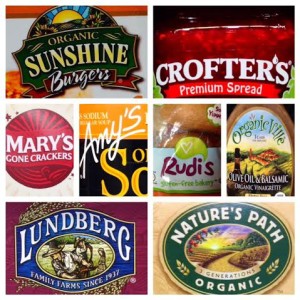
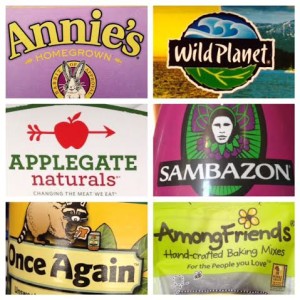
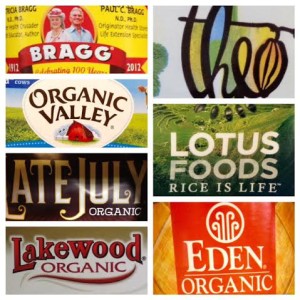
1. Organic Sunshine Burgers – veggie burgers
2. Crofter’s Premium Spreads – fruits spreads/jams
3. Mary’s Gone Crackers – crackers, cookies, pretzels
4. Amy’s – canned goods, breakfast items, candy, snacks, salsas, frozen goods, etc. Amy’s carries an abundance of products – check out their website for a full list.
5. Rudi’s – gluten-free and gluten- bread
6. OrganicVille – sauces, condiments, salsas, vinaigrettes, dressings
7. Lundberg – rice, pasta, rice cakes, entrees and sides, chips
8. Nature’s Path – cereal, granola and breakfast bars, granola, oatmeal, waffles, pancake mixes, toaster pastries
9. Annie’s – pastas, snacks, frozen goods, dressings, condiments, sauces
10. Wild Planet – canned tuna, sardines, anchovies, shrimp, salmon
11. Applegate Naturals & Applegate Organics – bacon, deli meats, hot dogs, cheese, frozen meats, HALF-TIME kid meals (much healthier version of “lunchables”)
12. Sambazon – superfruit juices, frozen superfruit packs, freeze-dried powders, healthy energy drinks
13. Once Again – nut butters, seed butters, packaged nuts, honey
14. Among Friends – baking mixes
15. Bragg – famous Apple Cider Vinegar with the “mother,” apple cider vinegar drinks, olive oil, dressings, vinaigrettes, sauces, seasonings
16. Theo – chocolates
17. Organic Valley – butter, milk, sour cream, cottage cheese, protein drinks, cream cheese, heavy cream, eggs, cheese, meat, produce
18. Lotus Foods – rice, rice products
19. Late July – chips, cookies, crackers
20. Eden Organic – canned beans (BPA-free cans), dry beans, cereal, condiments, pasta, snack foods, fruit juices, oils and vinegar, sea vegetables, spices and herbs, teas
21. Lakewood Organic – juices
Opposition to Organics
Some people fervently oppose organics. They say that organic food is not more nutritionally dense. They say that we would all starve if we only had organic farms because the yield would be insufficient. They say that it’s beyond crazy to pay “that much” for an apple.
I encourage you to form your own opinion. I encourage you to read more about this topic and make the right choice for the lifestyle you want to lead and the health you want to have. What you put into your mouth matters, there’s no going around that. So my question to you is… what type of food do you want to feed your body and mind?
Have you ever asked yourself why organic food is more expensive? I’m pretty sure that sewage sludge costs less than organic fertilizers, so my friends, you get what you pay for. In addition, the processes that maintain organic soil, organic food growth, and organic certification all play a significant role in the higher prices that we see at the grocery stores. Check out this article from HellaWella that succinctly summarizes reasons why organic food is more expensive.
We probably all know or have known people who smoke, drink, eat junk regularly, and live disease-free until their 90s or beyond. Those people are the exception. While I definitely advocate a balance in your lifestyle, you must always keep in mind that what you consume will affect your body, mind, spirit, and energy. Set yourself up for success as your grow older. Do you want to survive or do you want to thrive? Do you even know what your body and mind are capable of? Why not try to eat organic and see how you feel after a week, a month, 6 months? How will you ever know if you don’t try and implement something different in your health? I want you to make your own informed decision but I also want you to be the healthiest you can be. Eating organic is another step that you need to take in order to improve your health and overall well-being.
Many have also argued against the sustainability of organics. Check out The Wall Street Journal’s article about why organic farming is not sustainable as well as The Cornucopia Institute’s bold and opposing response to the article.
Another popular argument against organics is that the food is not as nutritious as people think. First read this article from US News that describes a study which found that organic food is not more nutritious. Then read this article to learn about the significant role soil plays in the nutrition content of organic food, the negative impact of fertilizers and pesticides, and about the higher levels of vitamins and minerals in organic food.
You must take your health into your own hands, my friends. Companies and corporations will employ the means necessary for them to yield profit, period. Anything that extends shelf life and improves the appearance of food, regardless of the damage to the taste or nutritional value, is what companies are going for. You must stay informed and understand this process. It is not the companies’ responsibility to keep you healthy, it is your own. So seek out the knowledge and information you need in order to be the healthiest you can be. Eat organic and see if your health, energy, weight, and mood improves. Don’t be afraid to experiment. Through trial and error you will learn what works for you and what makes you radiate physically, emotionally, and mentally.
What changes have you noticed in your health since you started eating organic? Let us know below!
Also what are your current struggles or questions related to this topic? Ask below!
0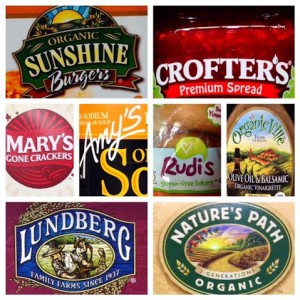
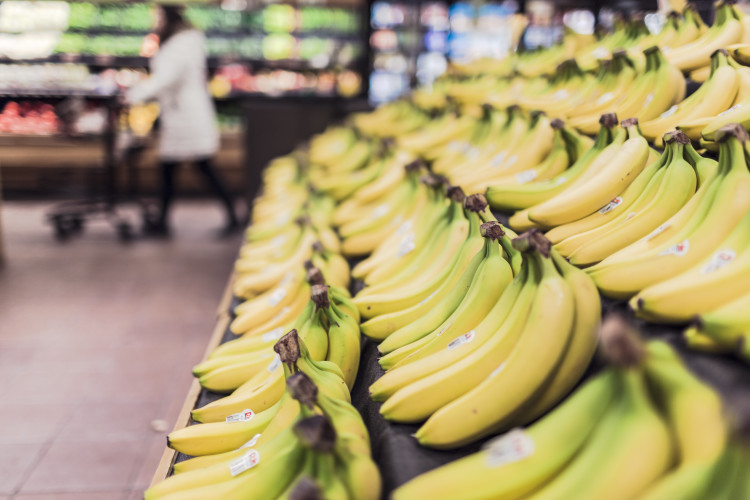


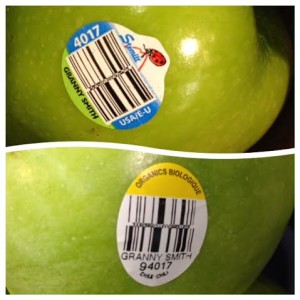
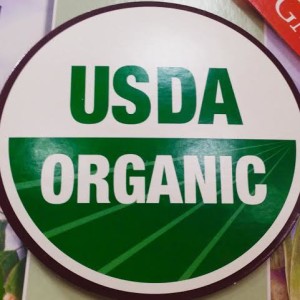
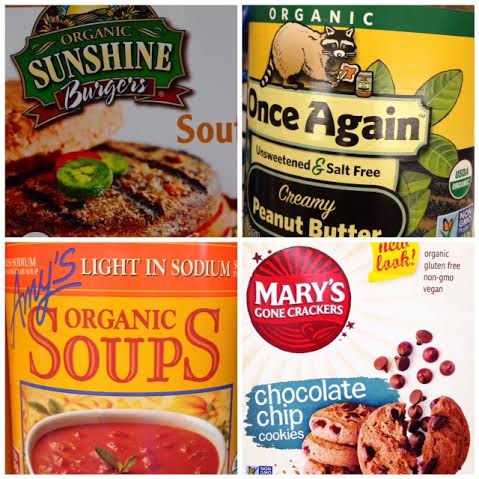

0 comments on “Launch Series Post #3 of 5: Is Organic Worth the Price?” Add yours →